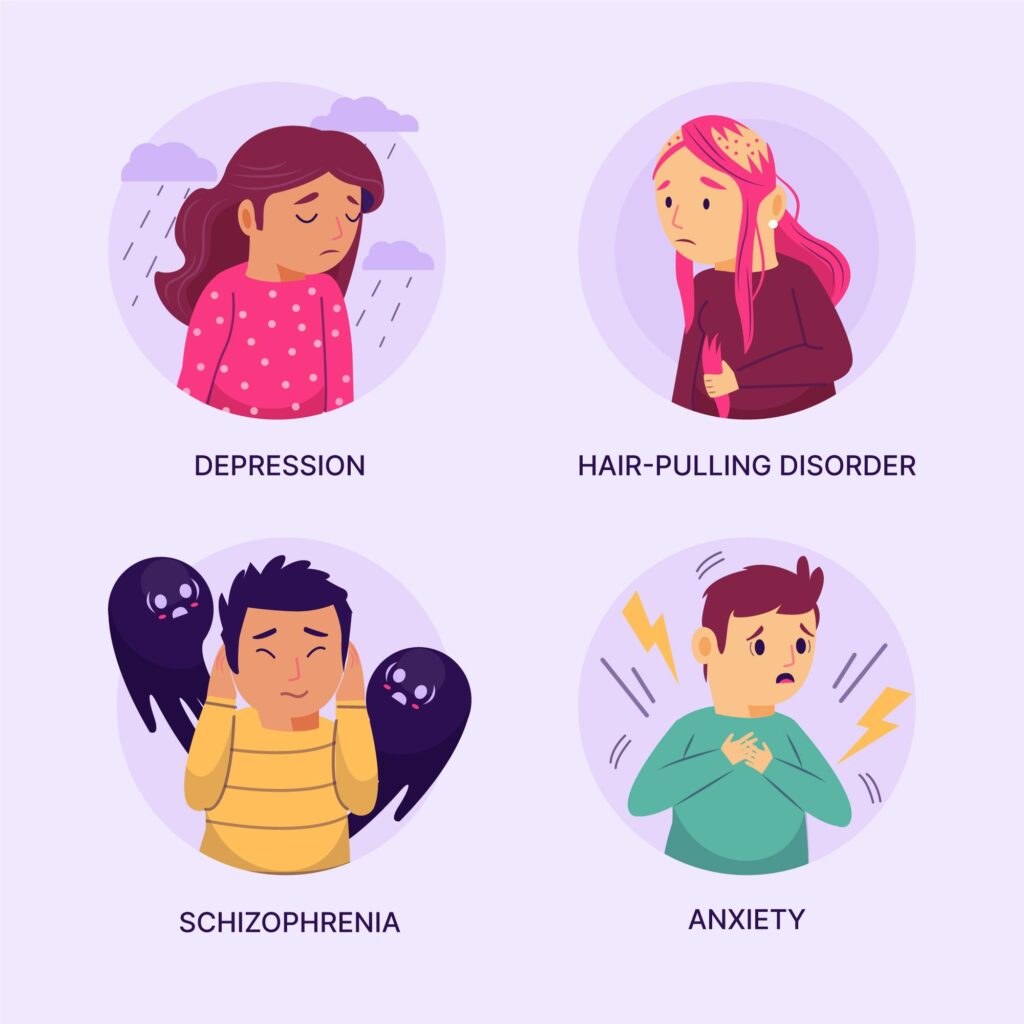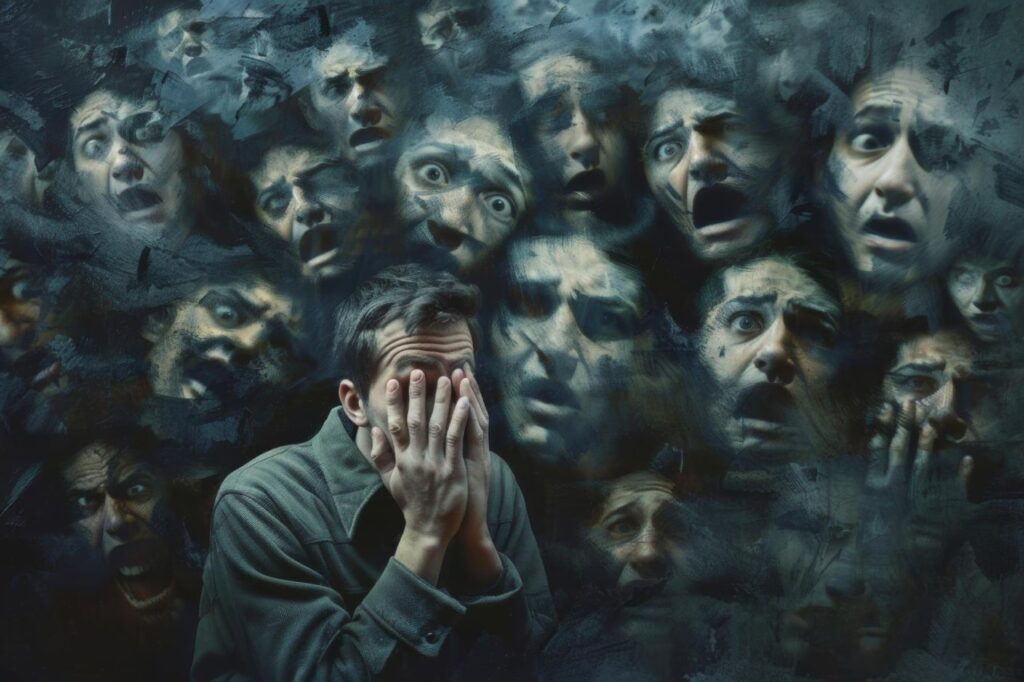
What is schizophrenia? It is a serious mental illness where the brain struggles to interpret reality correctly. People may hear voices, see things others don’t, or hold strong false beliefs (delusions). Unlike the common myth, schizophrenia is not split personality disorder.
The illness affects both men and women, often beginning in late adolescence or early adulthood. Without treatment, it disrupts education, relationships, and careers. The World Health Organization warns that people with schizophrenia face 10–20 years shorter life expectancy, mainly due to untreated health conditions and suicide risk.
Schizophrenia Symptoms
Positive Symptoms :-
Positive symptoms are extra behaviors added to a person’s experience. These include hallucinations, delusions, paranoia, and disorganized speech. For example, a patient may hear a voice telling them to do something, even when no one is speaking.
Negative Symptoms
These reflect a loss of normal behaviors such as reduced emotions, lack of motivation, poor hygiene, and social withdrawal. These symptoms often make daily life difficult and can be mistaken for depression.

Cognitive Symptoms
Cognitive issues include trouble focusing, weak memory, and difficulty planning. These symptoms make it challenging to maintain a job or education, even when other symptoms improve.
Together, these three categories explain why schizophrenia signs affect every aspect of a person’s life.
Early Signs of Schizophrenia
Schizophrenia early warning signs often appear during teenage years or early adulthood. Families may notice: dropping grades, sudden social withdrawal, disturbed sleep, and odd behavior such as talking to oneself. Because these signs resemble teenage rebellion or depression, schizophrenia often goes undetected until it worsens.
Early detection is critical—studies show patients treated within the first year of symptoms respond much better to therapy and medication.
Schizophrenia in Teenagers
Schizophrenia symptoms in teenagers are challenging to identify. Mood swings, irritability, and lack of interest in school are common in adolescence, but when combined with paranoia or hallucinations, they may signal schizophrenia. Parents, teachers, and caregivers should monitor sudden behavior changes, especially if teenagers show strong mistrust or isolate themselves.
Gender Differences: Schizophrenia in Women vs Men
Research highlights important differences:
- Men are usually diagnosed earlier (late teens to early 20s), and their symptoms tend to be more severe. They often experience stronger negative symptoms such as apathy and poor hygiene.
- Women are usually diagnosed later (late 20s to early 30s) and show better emotional connections. They tend to respond more positively to therapy and have stronger support networks.
These gender differences shape how schizophrenia treatment is planned for each patient.

Causes of Schizophrenia
The exact cause remains unclear, but experts agree it results from a combination of genetic, biological, and environmental factors:
- Genetics: Having a parent or sibling with schizophrenia increases the risk.
- Brain chemistry: Imbalances in dopamine and glutamate disrupt brain signaling.
- Environmental stress: Trauma, abuse, or difficult childhoods raise vulnerability.
- Substance abuse: Cannabis and hallucinogenic drugs can trigger symptoms in people already at risk.
Diagnosis of Schizophrenia
Schizophrenia diagnosis involves a detailed psychiatric assessment. Doctors rule out other conditions like drug abuse or bipolar disorder. According to the DSM-5 guidelines, at least two core symptoms (such as hallucinations or delusions) lasting six months are required for diagnosis. Brain scans and blood tests may be used to exclude other causes, but they cannot confirm schizophrenia directly.
Schizophrenia Treatment Options
Medication
Antipsychotic drugs reduce hallucinations and delusions. In 2025, long-acting injectable medications have improved patient outcomes by ensuring regular treatment.
Therapy
Schizophrenia therapy such as Cognitive Behavioral Therapy (CBT) helps patients manage stress and cope with symptoms. Family therapy improves understanding and reduces relapse.
Support Systems
Schizophrenia support groups—both local and online—connect patients with peers who understand their struggles. Schizophrenia recovery stories shared online inspire hope and motivate adherence to treatment.
Lifestyle Changes
Healthy routines—regular exercise, balanced diet, and avoiding drugs—are vital for stability.
Quick Living Tips for Schizophrenia Patients (Point List)
- Stick to your prescribed treatment plan consistently.
- Join support groups for motivation and encouragement.
- Practice mindfulness, yoga, or meditation to reduce stress.
- Maintain a strong support system of family and friends.

Global Schizophrenia Awareness in 2025
In 2025, awareness campaigns focus on reducing stigma and improving global access to treatment. Telemedicine has allowed patients from developing countries to consult doctors worldwide. Social media campaigns share schizophrenia recovery stories to inspire others. Governments are funding research for better diagnostic tools and next-generation medications.
This global shift is crucial because treatment availability is still unequal. In many low-income countries, mental health care is minimal, leaving millions untreated.
At what age does schizophrenia usually start?
Schizophrenia signs often appear in late adolescence or early adulthood, typically between ages 16 and 30.
Can schizophrenia be cured permanently?
No, schizophrenia cannot be cured, but with treatment—including medication, therapy, and support—patients can manage symptoms and live productive lives.
What causes schizophrenia?
Schizophrenia causes are a mix of genetic, brain chemistry, and environmental factors such as stress or trauma.
How is schizophrenia diagnosed?
Schizophrenia diagnosis is based on psychiatric evaluation, patient history, and DSM-5 criteria, not blood tests or scans.
What is the difference between schizophrenia and psychosis?
Psychosis is a temporary loss of reality, while schizophrenia is a chronic condition requiring long-term management.
Where can I find support for schizophrenia?
You can join schizophrenia support groups online, local mental health communities, or consult a licensed therapist for ongoing help.





